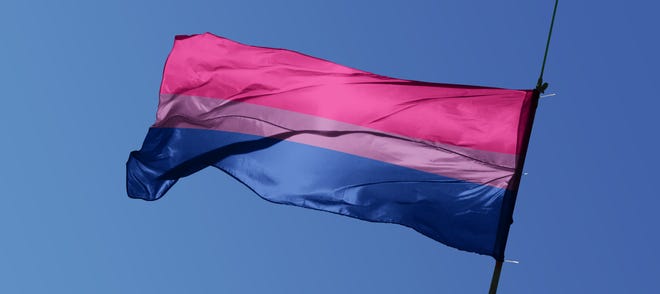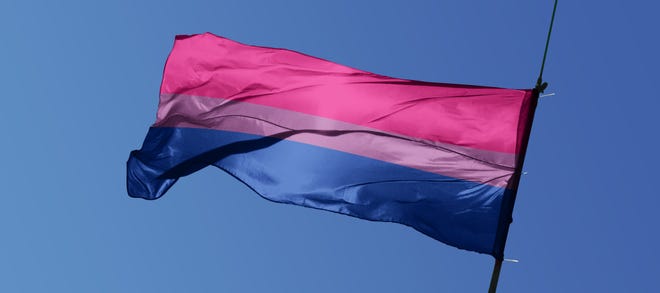The last time Lauren Krouse saw her primary care doctor, the medical assistant breezed through Krouse’s patient history form. She laughed and brushed off the question about sexual orientation.
“I don’t even know why I’m asking this,” the assistant said. She assumed Krouse was straight.
But Krouse is bisexual, and knows the assistant should have asked. Because for many bisexual people, disclosing sexual orientation is matter of health and safety.
Bisexual people are significantly less likely to disclose their sexual orientation than straight or gay people. Bisexuals are far less likely to be out to important people in their life, and about 39% of bisexual men and 33% of bisexual women reported not disclosing their sexuality to a medical provider. For gay men and lesbians, that number is 10% and 13%, respectively.
Bisexual people face unique bias, often even in their own community. This includes the belief from other LGBTQ individuals that bi women are actually straight and bi men are actually gay, and both are “confused” and “sexually risky.” There is also research indicating increased risk of suicide attempts, higher rates of mood and anxiety disorders and substance abuse. Advocates are working to change the landscape of medical care, pushing for a more affirming space where doctors have a holistic view of patients who may face these disparities.

Learn the ‘B’ in LGBTQ:History, difference between bisexuality and pansexuality
Coming out as LGBTQ:Could it be a thing of the past someday?
Bi+ individuals, an umbrella term that describes any attraction to more than one gender and includes pansexual and fluid sexual orientations, make up the largest population within the LGBTQ community. So why is staying in the closet at the doctor’s office so commonplace?
One possible explanation: Only about half of clinics in a 2018 study said they routinely ask about sexual orientation.

Those who are asked and choose not to disclose may fear biphobia, says Brian Feinstein, a researcher and associate professor at Rosalind Franklin University of Medicine and Science.
“Disclosure can have pros and cons … that can then put them at risk for discrimination, victimization,” Feinstein says. “Bisexual people have these same kinds of stigmatizing experiences with healthcare providers, where they’ll see providers who say things that essentially invalidate their identity, or even to the point of implying that once we fix your depression, and that’s better, you won’t be bisexual anymore.”
For Krouse, the assistant’s “flippant” comment was off-putting enough that she didn’t disclose her bisexuality to her doctor that day.
“When you disclose, that’s a different decision every single time, based on where you are emotionally and what you’re capable of handling,” Krouse says.
When disclosing makes a difference
While disclosing is a personal decision that some may not feel comfortable with, the Centers for Disease Control and Prevention urges doctors to at least ask so specific health care needs and disparities can be addressed.
About 61% of bisexual women report rape, physical violence or stalking by an intimate partner, compared to 44% of lesbian women and 35% of heterosexual women, according to the most recent National Intimate Partner and Sexual Violence Survey, Nearly half of bisexual women have been raped in their lifetime, compared to 13% of lesbian women and 17% of heterosexual women.
Licensed psychologist and Lehigh University professor Nic Johnson attributes this data to the perception of bi+ women in society.
“Hypersexual” is a word often attached to bi+ women, whose identity is viewed by men often as a “signal not of female agency but of female sexual commodification,” Johnson’s research explains.
“Because of our culture’s view of bisexual women as hypersexual, and even deviant in terms of their sexual behavior, maybe even well intended people are responding in ways that are really harmful, like ‘Well, what did you expect? Did you tell them that you’re bisexual?’” Johnson said.
Feeling excluded by both heterosexual and LGBTQ-oriented communities is an added stressor on top of trauma. And racism, on top of biphobia and sexism, further exacerbates trauma for bi+ women of color, Johnson’s research says.
If you’re not sharing your sexuality because of sexual health reasons, does telling your doctor that you’re bi+ even matter?
For Lux Alptraum, a writer and podcast host, it absolutely does.
“A lot of times being closeted, not feeling seen, existing in a biphobic society is a source of stress for bi people,” Alptraum says. “So if your doctor doesn’t understand that you’re bi and doesn’t understand that anxiety about being bi … how are they going to help you properly?”
Feinstein says the responsibility should be on medical providers to create an environment where people feel comfortable disclosing.
“When people disclose that they’re bisexual, if that’s to a provider who’s affirming, it could be met with support,” Feinstein says. “And that’s something that bisexual people so often are lacking or not receiving.”
Don’t call it a gym:Trans, Black-led movement groups reframe wellness
Bi+-affirming health care in practice
When Dr. Kimberly Herrmann started working at Whitman-Walker Health, a community-based health service in Washington, D.C., she knew she wanted a space to practice medicine that was specifically LGBTQ-affirming.

She creates a safe space by allowing patients to share what feels comfortable, focusing mainly on anatomy when it comes to sexual health.
“Medicine is really far behind in how we define people as humans,” Herrmann says. “And to me as a physician, I really need to know what body parts you have. Do you have a uterus? Are we worried about pregnancy? Do you have a penis? Are we worried about certain illnesses or infections that come with that?”
Until medicine “catches up,” she says, she’ll start every conversation by asking about pronouns, gender identity and sexuality.
Elizabeth Johnson, a counselor based in D.C., says that conversations with bi+ folks in therapy often start by not making assumptions based on previous sexual and relationship history.
Johnson says she regularly sees bi+ patients invalidate their own sexuality. Bi+ women who are in relationships with cisgender, heterosexual men report higher stress levels and depressive symptoms than those in lesbian relationships. Especially when first coming out, Johnson addresses stereotypes these patients might have internalized.
Johnson, who is a lesbian, says having queer-identifying medical professionals work with queer patients could be another successful pathway to bi-affirming care. She recommends all therapists address their own biases and assumptions they make about bi+ people.
For some, bi-affirming care could look as simple as a question on an intake form. For others, it’s a longer, ongoing conversation about sexuality and its nuanced impact on a patient’s life.
Herrmann prefers the latter.
“When you come in for a sore throat, it should feel like an affirming visit. Even when you come in for a stubbed toe, it should feel like an affirming visit,” Herrmann says. “It’s good to push medical care to think: how does bisexuality impact my care beyond sexual health?”
What is sexual health?:Sex educator Emily Nagoski on sexual well-being, pleasure and porn









